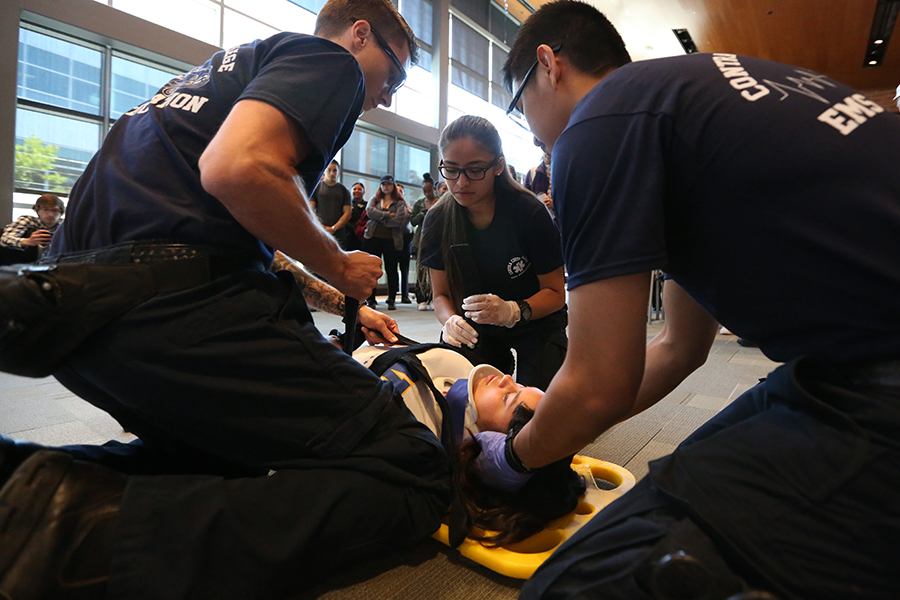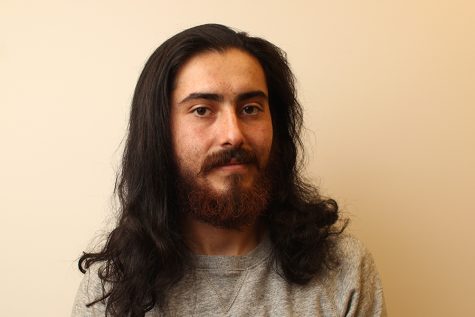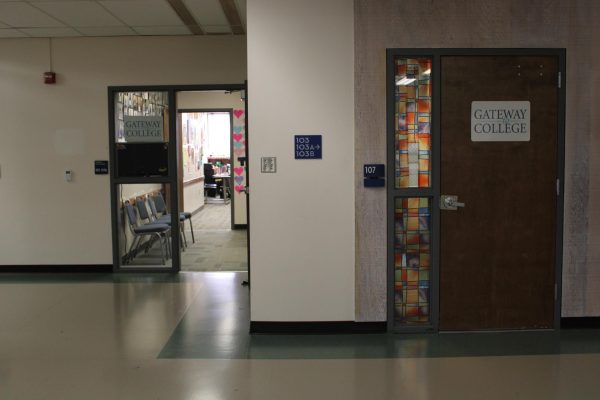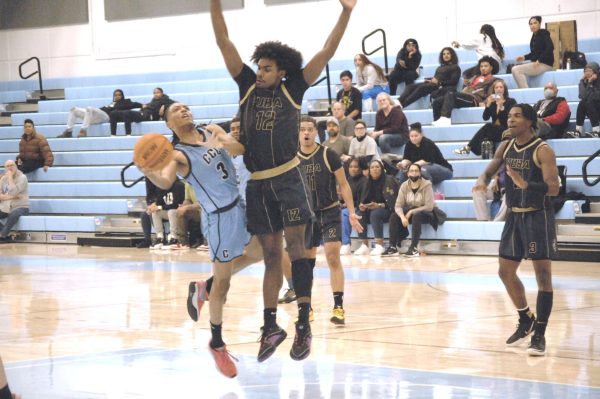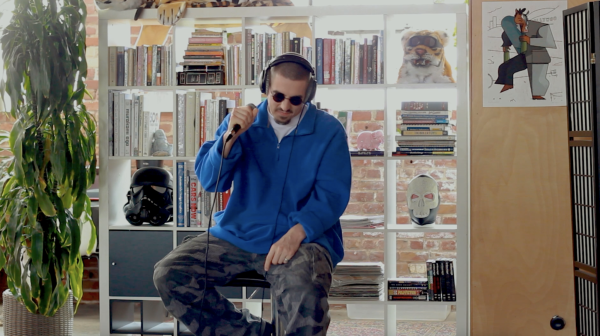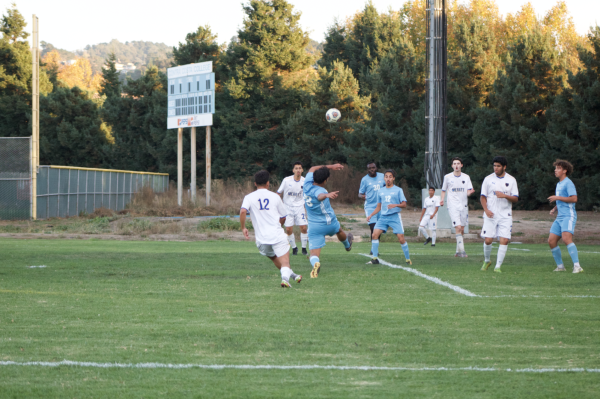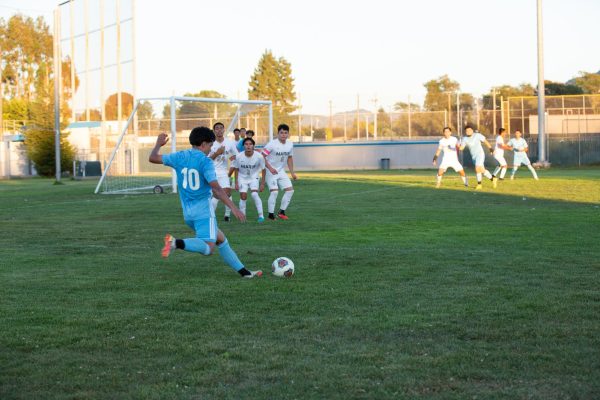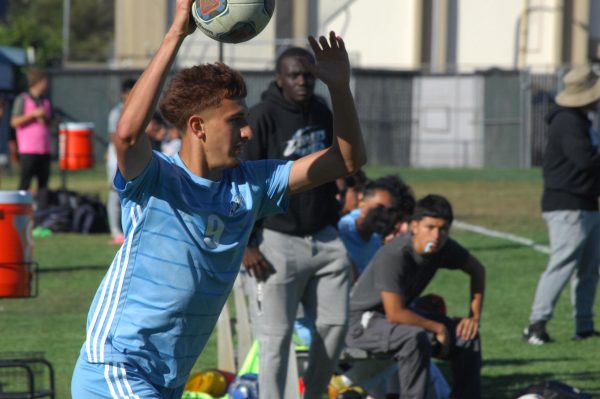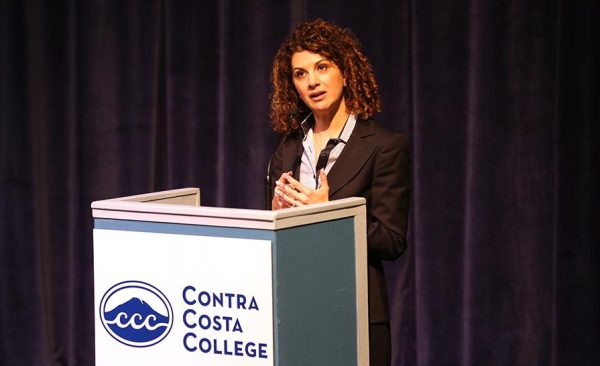Career technical programs save communities, lives
College receives national, state, local acclaim for first responder training programs
Pre-med student Alex Aquino (right), nursing major William Tucker (left) and fire science major Grechen Medel (center) perform a spinal immobilization demonstration for the crowd on administration of justice major Karla Polanco during a press conference in the Fireside Hall on Monday.
May 9, 2017
A lot of people don’t know how much community colleges help ensure public safety by training police officers, nurses and emergency medical workers, Council for a Strong America (CSA) California Office’s Director Susan Bonilla said at a press conference in the Fireside Hall on Monday.
But even less know about the struggles that Richmond Police Officer and former Contra Costa College student, Carmen Santana endured to reach success.
“I grew up thinking that domestic violence, drugs and gangs were part of the ordinary lifestyle,” Santana said as she calmed her nerves behind the podium. “The need to financially provide for my family became the priority.”
A room full of her peers, emergency medicine students, community business representatives, CCC faculty and district officials listened as she talked about how she lost faith in her ability to reach her career goals through education.
She said she enrolled into North Campus High School, a continuation high school in San Pablo, when she was kicked out of her former high school due to low grades and attendance.
“That’s when I felt like I hit rock bottom,” Santana said. “I was 17 (years old), and I didn’t know what to do.”
She said joining the Richmond Explorer’s Program, and enrolling at CCC, established a network of people who boosted her confidence, and helped her break stereotypes.
Santana said she earned her AA degree in administration of justice and liberal arts. She said she then went through the police academy and has been working as a Richmond Police officer for four years.
She said she is now a resource officer for teenagers at De Anza High School in El Sobrante. She said it is rewarding to help students who are enduring financial and cultural barriers similar to her own.
“I’m not just a normal male officer that most Latino families see,” she said. “It’s a male dominated career. When Latina females, or families who come from a different heritage, see a Latina female it makes it easier for them interact with me, to communicate with me and to trust me — I’m here to help them.”
Bonilla said this press conference was held to laud CCC’s contribution for giving students like Santana a chance to give back to the community while making a living wage.
At the end of the press conference, CCC was awarded a Certificate of Special Congressional Recognition on behalf of Calif. 11th Congressional District Representative Mark DeSaulnier.
Contra Costa County District Supervisor John Gioia said, “It is really a symbol of appreciation from a federal, state, county, city and neighborhood level for the work that this college does to make us and our communities stronger, safer and healthier.”
To maintain CCC’s contribution to public safety, and address the statewide skills gap employers face statewide, Bonilla told the audience that the CSA will:
- lobby for increasing state funding for community colleges at the state level.
- support dual enrollment for high school students seeking a career in law enforcement.
- influence state policymakers to incentivize helping high school students fill out Free Application for Federal Student Aid (FAFSA) in hopes of boosting community college enrollment.
- maintain support of the college’s career technical programs like California’s Pathway Trust, which is the largest CTE funded program nationwide.
At the end of the event, there were multiple demonstrations by emergency medical and administration of justice students on how to properly transport a person who cannot walk, and on how to take latent prints at a crime scene.
But before the demonstrations, public officials took this press release as an opportunity to show their support of programs that support public safety in communities statewide.
California Community College Chancellor’s Office Dean of Career Technical Education Jeffrey Mrizek also acknowledged CCC’s contribution to providing public safety workers at an affordable cost to taxpayers.
“When you are in a crisis, the people most likely to take care of you are paramedics, nurses, police officers, firefighters,” Dr. Mrizek said. “And a lot of these people are most likely community college graduates. They are the ones who provided the safety net for our communities.”
Interim Richmond Police Chief Walt Schuld said community colleges have trained about 80 percent of first responders working in California.


